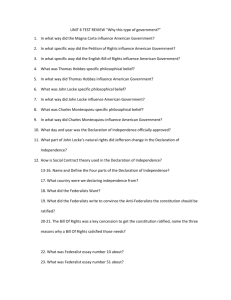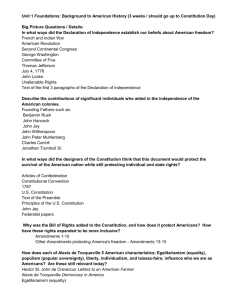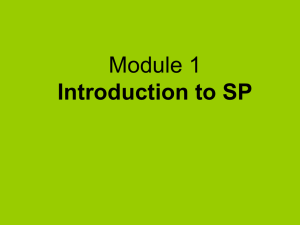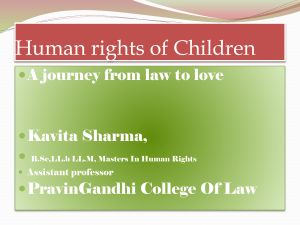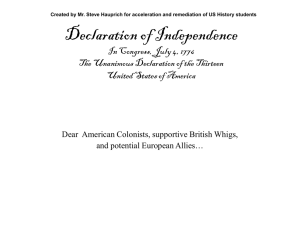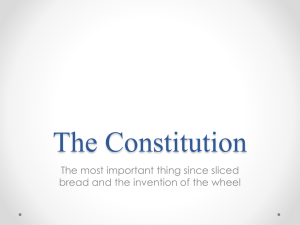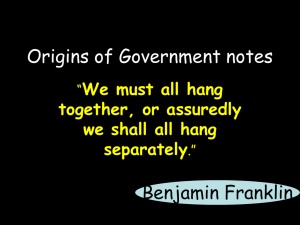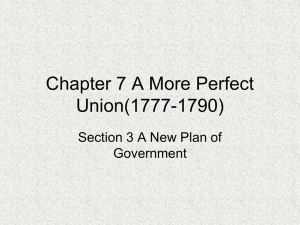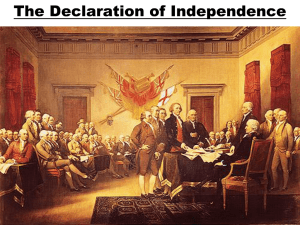U.S. History Unit 1 Review
advertisement
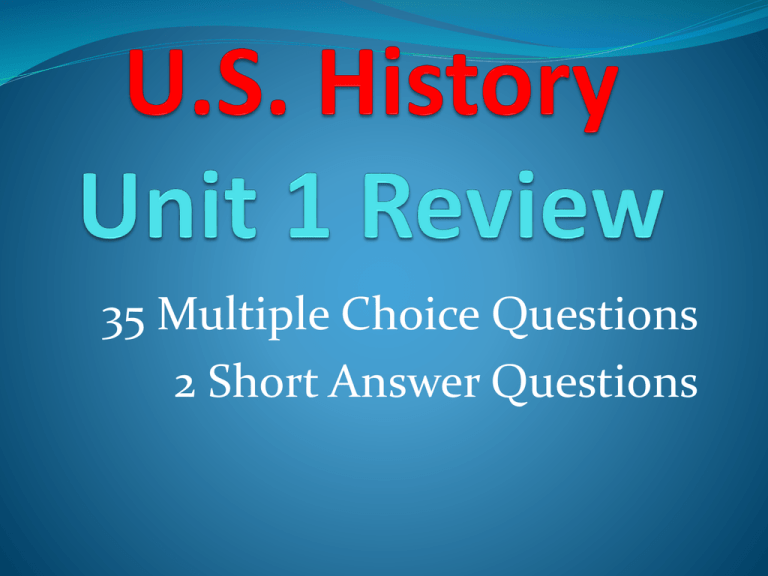
35 Multiple Choice Questions 2 Short Answer Questions Declaration of Independence • • • This was (essentially) our break up letter with England. Thomas Jefferson was the Primary author of the Declaration of Independence. Below you can read the first 2 paragraphs… Unalienable Rights = Important IN CONGRESS, July 4, 1776. The unanimous Declaration of the thirteen united States of America, When in the Course of human events, it becomes necessary for one people to dissolve the political bands which have connected them with another, and to assume among the powers of the earth, the separate and equal station to which the Laws of Nature and of Nature's God entitle them, a decent respect to the opinions of mankind requires that they should declare the causes which impel them to the separation. We hold these truths to be self-evident, that all men are created equal, that they are endowed by their Creator with certain unalienable Rights, that among these are Life, Liberty and the pursuit of Happiness.--That to secure these rights, Governments are instituted among Men, deriving their just powers from the consent of the governed, --That whenever any Form of Government becomes destructive of these ends, it is the Right of the People to alter or to abolish it, and to institute new Government, laying its foundation on such principles and organizing its powers in such form, as to them shall seem most likely to effect their Safety and Happiness. 7 Principles of the Constitution + Amendments FLIPRoCS Federalism: Powers of government are divided between national (federal) & state (local) governments Limited Government: Powers of federal government are limited to those specifically provided in the Constitution Individual Rights: Rights you are born with. Rights that cannot be taken away Popular Sovereignty: The people hold supreme power Republicanism: A democratic government of representatives elected by the people (we exercise republicanism by VOTING) Checks and Balances: Each branch has a way to “check” the other branch Separation of Power: Power of Federal government is divided between 3 branches (Legislative, Judicial, Executive) Amendments: Constitution can be amended to adjust with changing times The Constitution • The Supreme Law of the Land • Living Document • To originally ratify the constitution it took 9 of the 13 states to agree to it (3/4 of the states) • Only 27 Amendments have been added since it was signed • First 10 Amendments are collectively known as The Bill of Rights. http://www.youtube.com/watch?feature=player_detailpag e&v=UTX9YsMywks How Long Are They In Office? House of Representatives: Number of Representatives is based on the population of their state President: 4 Years Commander in Chief First President: George Washington Max of 10 years Senators: 2 Years 2 Per State 100 total as of today 6 Years The Bill of Rights Was added to the U.S. Constitution to protect our individual liberties 1st : Freedom of Religion, Freedom of Speech, Freedom of the Press, The Right of Assembly, The Right to Petition 2nd : A well-regulated militia is necessary to the security of a free state and for this reason people should have the right to bear arms. 3rd : Prohibits government from placing troops in people’s homes without their permission. 4th : Added to protect individuals from “unreasonable” search and seizures by government officials. If there is a reasonable expectation of privacy, a judge must sign a “search warrant.” 5th : A citizen cannot be deprived of life, liberty, or property without “due process of law.” Must be indicted by a grand jury. No Double Jeopardy Cannot be forced to self-incriminate Eminent Domain : Refers to the power of government over property in its territory. They can take your private property but it shall not be taken without just (or reasonable) compensation. 6th : Guarantees a fair and impartial trial to all persons accused of a crime; they must be told of the charges against them; they have the right to a trial by jury; and the right to a lawyer. 7th : Right to a trial by jury in civil disputes. 8th : Cannot require unusually high bail. Bans a court from punishing someone in a cruel or unusual way. 9th : Just because the Constitution lists some specific rights does not mean that citizens do not also hold other rights. 10th : The federal government has only those powers specifically given to it in the Constitution. All other powers are reserved to the states or the people. After the Civil War a group of amendments were passed. 13th : Abolished slavery 14th : Guaranteed all citizens “due process rights” and “equal protection” of the laws from state governments. 15th : Prohibited denying individuals their voting rights on the basis of race. These amendments gave us stepping stones when we got to the Civil Rights Movement in our country! Alexis de Tocqueville Egalitarianism: Society of equals Populism: Participation of the “common” people in political life Liberty: “Freedom” / Protection against tyrannical government Individualism: Government does not direct individual activity in daily life Laissez Faire: Government takes a “hands-off” approach People To Know John Hancock: Signed the Declaration of Independence President of the Continental Congress Signature on the Declaration became a symbol of freedom in the colonies. Benjamin Rush: Signed the Declaration of Independence “Father of American Medicine” Favored educating women and making a public university to train public servants John Peter Muhlenberg: Clergyman who recruited soldiers to fight against the British Part of the “Black Regiment” Rose to rank of general under George Washington People To Know John Trumbull, Sr.: Colonial Governor who sided with the colonies Friends with George Washington John Witherspoon: Signer of the Declaration of Independence President of New Jersey College (Princeton) John Jay: Helped write the Federalist Papers First Chief Justice of Supreme Court Negotiated boundary treaty with England Charles Carroll of Carrollton: Signed the Declaration of Independence One of the wealthiest men in the colonies Catholic


